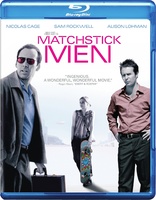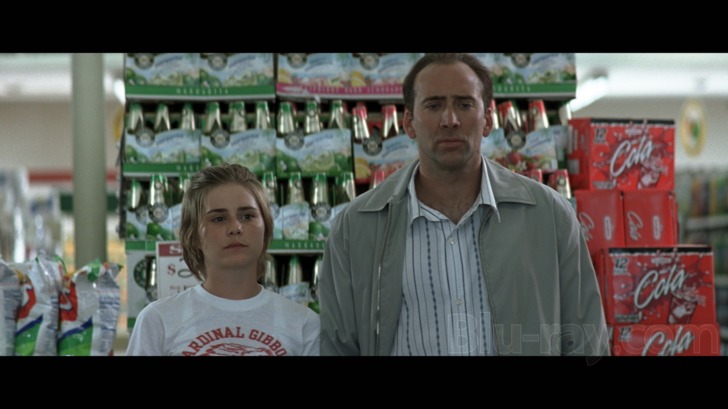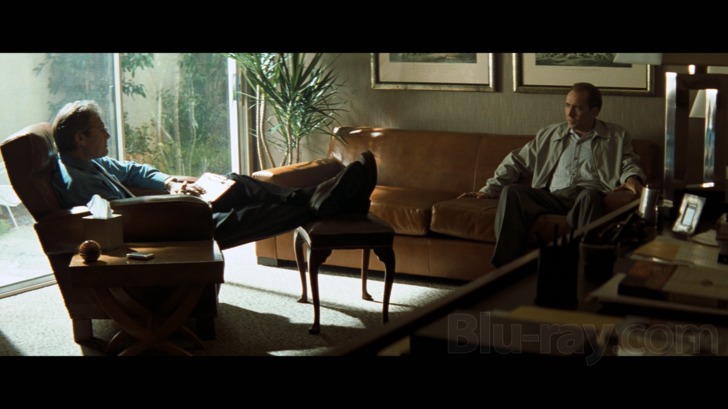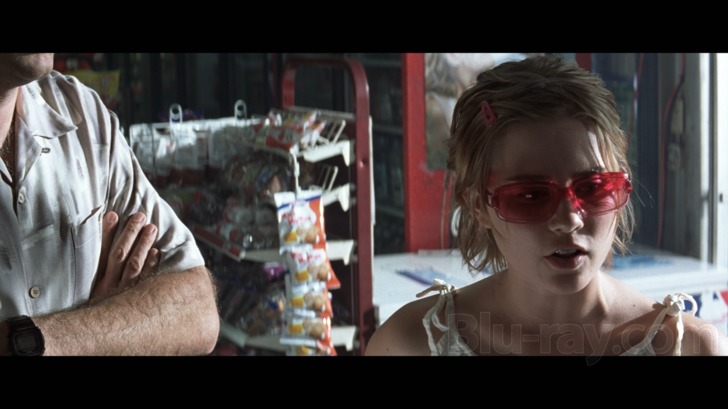Matchstick Men Blu-ray Movie
HomeMatchstick Men Blu-ray Movie 
Warner Bros. | 2003 | 116 min | Rated PG-13 | Oct 13, 2015
Movie rating
7.4 | / 10 |
Blu-ray rating
| Users | 0.0 | |
| Reviewer | 4.0 | |
| Overall | 4.0 |
Overview
Matchstick Men (2003)
The life of a phobic con artist is thrown into turmoil when the teenage daughter he never knew arrives unexpectedly.
Starring: Nicolas Cage, Sam Rockwell, Alison Lohman, Bruce Altman, Bruce McGillDirector: Ridley Scott
| Thriller | Uncertain |
| Crime | Uncertain |
| Drama | Uncertain |
| Comedy | Uncertain |
Specifications
Video
Video codec: MPEG-4 AVC
Video resolution: 1080p
Aspect ratio: 2.40:1
Original aspect ratio: 2.39:1
Audio
English: DTS-HD Master Audio 5.1 (48kHz, 16-bit)
French: Dolby Digital 5.1 (448 kbps)
Spanish: Dolby Digital 5.1 (448 kbps)
Spanish: Dolby Digital 2.0 (192 kbps)
Portuguese: Dolby Digital 2.0
Czech: Dolby Digital 5.1
Hungarian: Dolby Digital 5.1 (448 kbps)
Polish: Dolby Digital 5.1
Thai: Dolby Digital 2.0
Turkish: Dolby Digital 2.0
Japanese: Dolby Digital 2.0
Spanish DD 2.0=Latin; Japanese is hidden
Subtitles
English SDH, French, Japanese, Portuguese, Spanish, Czech, Danish, Finnish, Greek, Hebrew, Hungarian, Korean, Mandarin (Traditional), Norwegian, Polish, Romanian, Swedish, Thai, Turkish
Discs
50GB Blu-ray Disc
Single disc (1 BD)
Playback
Region free
Review
Rating summary
| Movie | 4.0 | |
| Video | 4.5 | |
| Audio | 4.0 | |
| Extras | 4.0 | |
| Overall | 4.0 |
Matchstick Men Blu-ray Movie Review
Tick, Tick . . . Boom!
Reviewed by Michael Reuben October 13, 2015Director Ridley Scott made Matchstick Men to fill up several months of downtime during the long prep for a historical epic called Tripoli, which was scheduled to begin shooting in early 2004, until Fox pulled the plug. Scott jumped directly into Kingdom of Heaven, but his time hadn't been wasted. He had managed to complete one of the hidden gems of his diverse career, a film ripe for rediscovery in this excellent Blu-ray presentation from Warner Home Video. Although the two films have nothing in common, Scott likens Matchstick Men to Thelma and Louise, because neither is the kind of film with which he is typically associated. Both are character-driven stories in contemporary settings, whereas Scott is best known for historical epics like Gladiator or sci-fi tales like Alien, Blade Runner and Prometheus. Scott also sees another key similarity between the con games of Matchstick Men and the feminist road trip of Thelma and Louise—to him, they are both comedies. Despite many dark elements in each film, Scott wants viewers to laugh with the characters through their pain (and sometimes at them too). Matchstick Men began as a script by Ted Griffin (Ocean's Eleven) and his brother Nicholas, based on the novel by Eric Garcia (Repo Men). Robert Zemeckis was originally slated to direct (and retains an executive producer credit), but Zemeckis dropped out for The Polar Express. However, as the Griffin brothers observe on the commentary track, it eases the pain of losing Zemeckis when he's replaced by Ridley Scott. After a short prep, detailed in the accompanying "Tricks of the Trade" documentary, the film was shot in and around Los Angeles and the San Fernando Valley, with most of Scott's regular crew.

The central figure in Matchstick Men is Roy Waller, a career small-time con man (or "con artist", as Roy prefers) who suffers from enough ticks, neuroses and OCDC behaviors to fill several textbooks on psychiatry. Roy is played by Nicolas Cage in a casting decision that Scott considered crucial, because Roy does many offensive things during the course of the film—even he thinks they're offensive—but Cage has the ability to win over an audience even when he's behaving badly. Roy's junior partner, Frank Mercer, is played by Sam Rockwell, in a carefully modulated performance that establishes Frank as the yin to Roy's yang. Where Roy works hard at not being noticed, dressing in bland colors and unassuming attire, Frank is flamboyant in his dress and outrageous in his behavior. "You're calling attention to yourself" is Roy's common complaint to his younger colleague. Frank is also more ambitious than Roy, and he keeps pressing his older partner to undertake something more lucrative than the penny-ante "short cons" they do every day. Frank wants to target a rich mark for a "long con" with a big payoff, but Roy won't take the risk. His motto is: "Simple is safe." Their current scheme involves cold-calling suckers, who are told that they've won a fabulous prize but must purchase something to qualify, for which Frank and Roy hugely overcharge. There's more, but the essential element is that the score is quick and clean, and the perpetrators vanish without a trace. Roy's nervous conditions would appear to disqualify him as an effective con artist, but in fact most of them recede whenever he is working. On his own, he becomes a house-bound agoraphobe, aggressively cleaning everything to avoid germs, opening and closing each door three times, blinking and twitching compulsively and eating only tuna from cans. He takes pills prescribed by a shrink to help tame these problems, but panic sets in one day when Roy discovers that he's out of pills and the doctor who prescribed them has relocated. Desperate, Roy tries a new therapist, Dr. Klein (Bruce Altman), who won't prescribe medication unless Roy makes an effort to talk about the inner turmoil that is feeding these neuroses. Thus does Roy come to reveal that he once was married to a wife who left him fifteen years ago when she was pregnant. With Dr. Klein's assistance, Roy meets Angela (Alison Lohman), the 14-year-old daughter he never knew he had. Suddenly his life is turned upside down by the insistent intrusions of a teenager who wants to know everything about the mystery father who has just reappeared. With girlish insistence, Angela worms out of Roy what he does for a living, but instead of being repulsed, as he feared, she's fascinated and wants to learn more. After the initial shock wears off, Roy discovers that he's changing. He smiles more often. He even laughs occasionally. He actually works up the nerve to ask the name of the attractive checkout lady at the supermarket (Sheila Kelley) at whose register he always waits, even when the line is shorter elsewhere. And he agrees to work a "long con" with Frank on an especially ripe mark named Chuck Frechette (Bruce McGill), whose shady dealings in import/export make him an ideal candidate. Matchstick Men is the story of Roy's redemption through meeting Angela, but his path to salvation is far from direct, and some of the turns are sharp and jarring. As Roy explains to Angela in teaching her the art of the con, most things are beyond your control, and improvisation is key. Everything that Angela throws in Roy's direction requires him to improvise, and the relationship challenges him to his limits and beyond. Both Roy and Angela end up in very different places from where they started. It's up to the viewer to decide whether they landed where they belong. Scott has said that he was careful not to shoot his San Fernando Valley locations with too glossy a texture, lest the film resemble a commercial, but he likes the look of the place and he can't help making a picture that's visually appealing. Whether it's the interior of Roy's house illuminated by the undulating blue water from the huge backyard pool in which he never swims, or the massive Anaheim Convention Center that doubled for LAX, or the high school in Venice where Roy goes to pick up Angela, or the various drug stores, supermarkets, restaurants and shopping mall offices where so much of Matchstick Men takes place, Scott and DP John Mathieson find interesting angles and striking light that gives the film a timeless, formal elegance. The film hasn't dated in twelve years and probably won't date in twelve more. Though he surrounds the central relationships with a beautiful frame, Scott favors closeups, because he wants to focus on what is happening inside the frame. The cast, especially Cage and Lohman, have such remarkable chemistry that you are thoroughly drawn into their characters' emotional dynamic. The film takes several viewings to absorb, but it's worth it.
Matchstick Men Blu-ray Movie, Video Quality 

Frequent Scott collaborator John Mathieson (Gladiator) shot Matchstick Men with a high-contrast clarity that emphasizes the presence of the Southern California sun, even as it creates shadows and reflections indoors. The stark delineation between interior and exterior spaces is a subtle reminder of Roy's agoraphobia, which waxes and wanes with developments in the plot. For its Blu-ray debut, Matchstick Men has been newly scanned at 2k from an interpositive by MPI (Motion Picture Imaging), Warner's on-site facility. The results, on the 1080p, AVC-encoded Blu-ray, are spectacular. Detail is crisp and clear at the focal point of the anamorphic lens (as Scott notes in his commentary, depth of field is limited with anamorphic, and he wanted that falloff of focus for this film). The color palette is gorgeously varied, ranging from the warm earth tones of Dr. Klein's office to the cold hues evident throughout Roy's apartment, including the blue/green reflections from his pool. In Roy's scenes with Angela, the colors tends toward warmth, unless they're working a mark together, because Roy's work palette is always chilly. The Blu-ray image is fine-grained and shows no sign of untoward digital manipulation. Warner has mastered Matchstick Men with an average bitrate of 29.91 Mbps, thereby providing further confirmation that the era of bitrate-starved catalog releases is now over.
Matchstick Men Blu-ray Movie, Audio Quality 

Matchstick Men's 5.1 sound mix, encoded in lossless DTS-HD MA, deftly shifts between objective reality and Roy's internal state at key moments, such as the early scene when Roy and Frank are posing as FTC agents while visiting an older couple. One of them slides open a glass door, triggering Roy's agoraphobia, and the soundtrack instantly moves the viewer into Roy's head as he becomes encased in anxiety. In other locations, such as the airport, a bowling alley or the strip club where Roy and Frank first make contact with Frechette, the soundtrack provides an unobtrusive but effective sense of environment. Several notable sound effects that can't be further identified without spoilers register forcefully. Dialogue is always clear. The music of Matchstick Men is especially important; composer Hans Zimmer speaks at length in the "Tricks of the Trade" documentary about his struggle to find the right tone for the score. Intercut with Zimmer's score are a selection of classics by Bobby Darin and Frank Sinatra, which Scott chose to help give the film a timeless quality, as well as instrumental selections by Herb Albert and the Tijuana Brass and Mantovani and his Orchestra. Add in a little Roxy Music, some Marvin Gaye, a dash of Wayne Newton and few songs by Kid Rock, and you have one of the most eclectic soundtracks in recent film. Somehow it works.
Matchstick Men Blu-ray Movie, Special Features and Extras 

The extras have been ported over from Warner's 2004 DVD of Matchstick Men.
- Commentary by Director Ridley Scott and Writers Nicholas Griffin and Ted Griffin: Scott and the writers were recorded separately and edited together, with Scott's comments occupying the lion's share of the running time. Scott does wonderful commentaries, and this one is no exception. His total immersion in the process is evident throughout, whether he's discussing the choice between shooting with anamorphic lenses or spherical, or a character's background (he provides an entire backstory for Dr. Klein), or why he enjoys shooting in the San Fernando Valley. The Griffin brothers describe the evolution of the script at various stages and note places where it changed even during shooting.
- Tricks of the Trade: Making Matchstick Men (480i; 1.78:1, enhanced; 1:11:46): Shot, produced and directed by Charles de Lauzirika, the unofficially official historian of Scott's work, this comprehensive documentary follows the director and his crew from the earliest location scout through the final scoring. Along the way, de Lauzirika captures the authentic feel of an active movie set, including the occasional moment when things go wrong (e.g., a camera jamming on an otherwise great take). Scott, the producers and the writers are all interviewed, but the unexpected star of the show is Assistant Director K.C. Hodenfield, who demonstrates what an important and difficult job a first A.D. performs.
- Part I: Pre-Production (24:55)
- Part II: Production (27:57)
- Part III: Post-Production (18:53)
- Theatrical Trailer (480i; 2.40:1; 2:34).
Matchstick Men Blu-ray Movie, Overall Score and Recommendation 

The notion of the artist as a trickster and deceiver is as old as the Greeks, which is no doubt why stories about con artists never go out of style, especially in the movies, which are one of the most deceptive forms of storytelling. The actors are pretending to be other people; the photography pretends that there aren't hordes of crew and piles of equipment just out of sight; and the editing pretends that actions are occurring in real time, instead of a calculated assembly of shots taken days, weeks or even months apart in locations nowhere near each other. Like the most willing of marks, movie audiences routinely consent to being deceived, even as they claim to know better. Matchstick Men is one of those rare con films that is just as much interested in the characters of the con artists, maybe even more so, than in the mechanics of their plans. This quality ranks it with such otherwise dissimilar works as The Grifters and The Sting. Scott is right to call it a comedy, but it may also break your heart. Highly recommended.
Similar titles
Similar titles you might also like

After the Sunset
2004

21
2008

No Good Deed
2002

The Thomas Crown Affair
1999

The Real McCoy
1993

Confidence
2003

Inside Man
2006

Gambit
2012

The Sting 4K
1973

Life of Crime
2013

The Next Three Days
2010

A Bluebird in My Heart
2018

Best Laid Plans
1999

Runaway Jury
2003

High Crimes
2002

Heist
2001

Ocean's Eleven
2001

The Big Bounce
2004

Sneakers
1992

The Lookout
2007